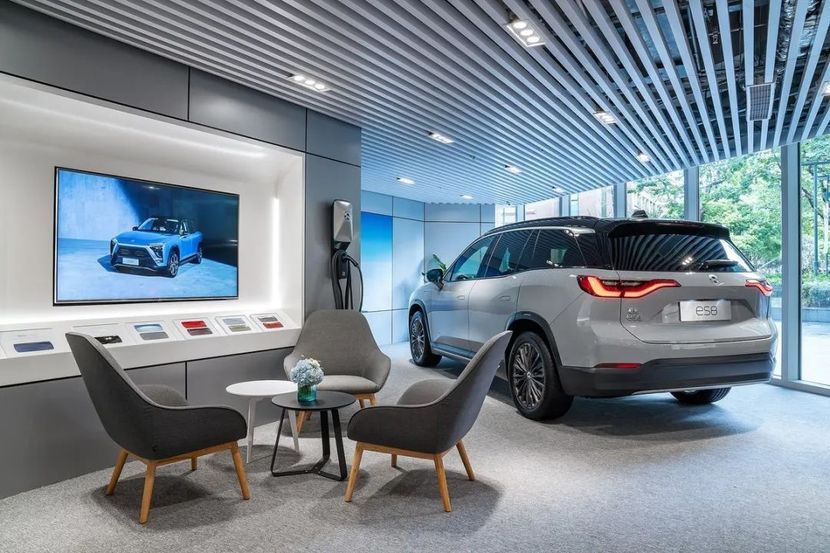
On June 27, Nio opened a Nio Space at Deyang Wanda Plaza, which is Nio's 127th offline store.
Previously, Nio (NYSE: NIO) has attracted attention for its offline stores in Beijing's Chang'an Avenue and Shanghai's Lujiazui, where rents can easily exceed 100 million yuan.
This year, however, it has started opening more stores in third- and fourth-tier cities like Deyang, and most of them are Nio Houses that are only a tenth or smaller of the size of Nio Space.
Nio is not the only ones accelerating their offline store layout. Xpeng, Li Auto, and WM Motor have also recently been stepping up their offline channels and likewise expanding from their original tier 1 and 2 cities to tier 3 and 4 cities.
In early 2020, before the Covid-19 outbreak, Nio's vice president of user operations, Wei Jian, said at a media briefing that he expected that by the end of 2020, Nio will have built about 200 stores in the country consisting of Nio Houses and Nio Spaces. At that time Nio had 77 offline stores.
As of July 10 this year, the number of Nio stores has reached 130, which means that since the beginning of 2020, Nio has opened 53 new stores offline.
And in the next five months, Nio will open 70 more stores.
Li Auto, which has already filed a prospectus in the US, is also expanding its offline stores.
In an interview with the Hupan University, Li Xiang, founder of Li Auto, said that it has set a target of opening 60 new stores for the year, up from the originally planned 60.
"20 stores meant letting go of the opportunity to competitors. So after the strategy was adjusted, we changed the number of store openings this year from 20 stores for the whole year to 60 stores for the whole year, which is a channel of expansion." Li Xiang said.
This year, Xpeng and WM Motor have also been making moves in terms of offline stores.
On May 1, Xpeng opened 17 stores in 11 cities across China at the same time.
As of June 30, 2020, the number of Xpeng's offline outlets has reached 190, of which 99 are experience centers, 64 are service centers, and 27 sales and service centers.
Within one month in June this year, WM Motor opened 15 service centers in Zhenjiang, Hefei, Fuzhou, Guangzhou and other cities.
WM Motor currently has close to 200 stores in over a hundred cities across the country, which is spread across Tier 3 and 4 cities.
Tesla's moves are also very notable.
Since 2013, when Tesla opened its first direct-operated store in China at Beijing Qiaofu Fangcaodi Shopping Center, Tesla has now opened in 58 experience stores and showrooms were opened in China, mainly in first-tier cities.
In March 2019, Tesla had announced that in order to cut costs, it would close most of its brick-and-mortar stores in the United States and keep only a few stores.
At the time, Tesla made it clear that this policy did not include China. But Tesla China was inevitably affected by the policy.
In November 2019, it was reported that Tesla's two experience stores in Beijing's Chaoyang Joy City and Shanghai's Pudong Kerry Center had closed. The reports cited people close to Tesla as saying that Tesla is systematically closing luxury locations in China's first- and second-tier cities to overdrive more smoothly to an online sales model.
This current strategy has changed again. On June 14 of this year, Grace Tao, Tesla's vice president of external affairs, announced on Weibo that Tesla's 45 Chinese The urban entry program includes a large number of third-tier cities, including Jinhua, Shaoxing, Huizhou, Jiangmen, and Xining.
Although they are all offline stores, the offline stores built by these EV companies and 4S stores commonly used by traditional automakers playing field is very different.
In the choice of address, the traditional 4S shop area demand is larger, so they are generally located in the suburbs.
New carmakers, on the other hand, locate their stores in prime locations in urban shopping centers.
In the case of Nio, for example, the selection criteria are "one of the best commercial centers in the city, in the atrium or at the entrance of the candidate site".
Due to the high rents in prime locations, offline stores of new carmakers are generally smaller than 4S stores - Nio's Nio Space, which is usually under 200 square meters; Tesla's experience store is also around 300 square meters.



